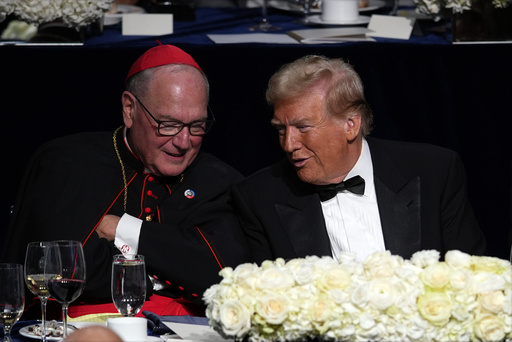
In the recent election, Donald Trump secured a similar level of support among various religious voter groups as in his previous contest against Joe Biden, but there were some notable shifts. Particularly, he saw improved backing from Catholic voters, according to data from a robust survey of over 120,000 participants.
In the 2020 election, the Catholic demographic, one of the largest religious segments in the country, was nearly evenly divided, with Trump garnering 50% of their support and Biden, a fellow Catholic, receiving 49%. However, this year, the figures shifted: 54% of Catholic voters cast their votes for Trump, while 44% supported Kamala Harris. This change was particularly pronounced in states such as North Carolina, Florida, and Texas.
The survey also revealed a significant racial divide among Catholic voters. Approximately 60% of white Catholics supported Trump, with only around 40% opting for Harris. Conversely, among Latino Catholics, the numbers were inverted, with about 60% favoring Harris compared to 40% for Trump.
In comparison to his 2020 performance, Trump’s support from evangelical Christians remained consistent, with roughly 80% backing him in both elections. VoteCast highlighted additional trends among different religious groups: about 80% of Black Protestants supported Harris, alongside 69% of Jewish voters and two-thirds of Muslim voters. In contrast, around 60% of Mormons and 70% of nonreligious voters leaned towards Harris as well.
The 2024 electoral landscape indicated a sharp divide among Catholic voters on critical social topics. Many conservative Catholics deemed the Democratic Party’s firm stance on abortion rights a primary reason for supporting Trump, while some liberal Catholics criticized his approach toward migrants and lack of commitment to social justice. Rev. Sam Sawyer, a Jesuit editor, emphasized the need for advocacy for migrants, reflecting concerns about Trump’s past campaign promises on immigration.
Kristan Hawkins, president of Students for Life of America and a Catholic convert, voiced her disappointment regarding Trump’s preference for allowing state-by-state abortion laws instead of pursuing a national ban; yet, she remained a devoted supporter. She articulated that her role as a Catholic voter is not to elect a religious leader, but rather someone who could minimize societal issues, emphasizing that “either way, you are voting for a sinner.”
Regarding Kamala Harris, who advocates for abortion rights, Hawkins maintained that her positions are not favorable from a Catholic perspective. Archbishop Thomas Wenski of Miami conveyed a sense of cautious optimism relating to a potential Trump presidency, suggesting that recognizing the contributions of migrants to the U.S. economy could lead to constructive immigration policies.
Discussing abortion and related issues, Wenski noted concerns with the Biden administration’s policies as they sometimes infringe on religious liberties, while he appreciated Trump’s judicial appointments. He expressed relief over the failure of Florida’s extreme pro-abortion measure to meet the necessary support threshold. Still, he acknowledged a considerable amount of work lies ahead to foster a culture that values life.
Overall, Trump’s acquisition of roughly 30% of Jewish votes paralleled the previous election results. Ted Deutch, leader of a major Jewish organization, expressed hopes for partnership with Trump’s administration on pro-Israel policies and addressing antisemitism.
Conversely, the Jewish Council for Public Affairs criticized Trump’s victory, expressing apprehension for communities that feel threatened by his campaign rhetoric, highlighting concerns over anti-democratic and xenophobic sentiments fostered during his time in politics.
